- Home
- Kristin Harmel
Life Intended (9781476754178) Page 14
Life Intended (9781476754178) Read online
Page 14
The audience claps when Hira is done, and her performance is followed by four others. Hannah is the last to go, and Miss Kay tells us she’ll be playing the first movement of Beethoven’s Piano Sonata No. 32 in C Minor. I know it’s an extremely complicated piece of music, and I’m concerned that Hannah’s being set up for failure. It’s more than a typical child, even a talented one, should be able to master.
“Patrick?” I murmur, but he just puts a gentle finger on my lips and smiles as Hannah removes her cochlear implant processors and sets them on the bench beside her. As she begins to play, the room goes still. I’m frozen as I watch her fingers move swiftly across the keys, coaxing a complex melody out of the piano. Her tempo is a little slower than I expected, but she stays in perfect rhythm, and I realize after a few moments that I actually like the speed at which she’s playing. It’s becoming clear that this is her interpretation of the piece, and that she’s deliberately putting her own touch on it. I’m floored.
When she finishes, the room is so silent and motionless that it seems frozen. For a split second, I wonder if I’m the only one who heard how beautiful her playing was. But then the audience bursts into applause, a few parents even standing and whistling. Patrick squeezes my hand and tears of pride sting my eyes.
When the clapping subsides, Miss Kay steps to the center of the room and gestures to the piano, where Hannah is still sitting, looking self-conscious. “As I mentioned,” Miss Kay says, “that was one of Beethoven’s piano sonatas. In fact, it was the last one he wrote, about five years before his death. By the time he composed it, he was almost entirely deaf.”
I hear a few people mumble words of surprise to each other, and I can feel myself leaning forward to hear what she’ll say next.
“Perhaps then,” Miss Kay continues, “it’s appropriate to tell you now that Hannah, my star pupil, is deaf too. She has cochlear implants, which help her to process speech, but they have a different effect on music, so Hannah removes hers to play. Much like Beethoven himself, whom Hannah says is an inspiration to her, she played this entire sonata with only a very small fraction of the hearing most of you have.”
The room seems to explode in a cacophony of astonished voices and exclamations, and I feel the warm heat of pride spreading across my face. But do I have the right to feel proud of a girl I have no real recollection of raising, a girl I’ve only just met?
Patrick interrupts my train of thought by squeezing my hand.
“I want to stay,” I blurt out before I can think about it. The room goes instantly dark and blurry, and I regret the words right away.
“What?” Patrick asks from somewhere far away. “Kate, we promised we’d take Hannah and my mom to brunch, honey.”
“Right!” I manage to say into the void. He thinks I’m saying I want to stay in this room—not this life. “Brunch!” The room comes back into focus, and I’m relieved to be here again but sad to know it’s only temporary. There’s no way to make this world mine.
After pierogis at Veselka, the Ukranian restaurant on Second Avenue where Patrick and I used to love having lazy Sunday breakfasts, we put Joan in a cab back to the train station, then Patrick, Hannah, and I decide to walk home because it’s an unusually crisp summer day, at least fifteen degrees cooler than it was yesterday. It occurs to me as we make our way down Second that the real-world forecast hadn’t called for a temperature drop, which is just a further reminder that this dream isn’t real. I take a deep breath and reach for Hannah’s hand on one side and Patrick’s on the other. I’m determined to enjoy every second of this fantasy before it fades away.
On the way home, Hannah keeps up an almost endless stream of chatter, telling us about her friends, her obsession with One Direction, and her burning desire—as she puts it—to have a new iPhone. I can see Patrick suppressing a smile as she extols the virtues of the phone, and when he and I exchange amused looks, I feel a deep sense of sadness and regret. The simple perfection of this moment is the kind of thing I would almost certainly have taken for granted if this was the life I was really living. Instead, because it’s the life I missed out on, every passing second feels like a miracle.
I look away, pretending to study a billboard, so that neither Patrick nor Hannah can see how close I am to crying.
Back at our apartment later that night, I’m stunned to still be here; it’s the longest I’ve spent in this reality. Might I be able to stay for the night, awaken here tomorrow morning? I think I already know the answer is no, but I want to believe in the possibility.
“Want to tuck Hannah in?” Patrick asks me with a gentle smile as she emerges from the bathroom in a cloud of steam and plods into her bedroom. “I’m going to finish the dishes.”
“Of course.” My heart flutters at the prospect of a few minutes alone to tell her I love her and that I hope she has the sweetest of dreams.
I head down the hall and knock on her door then peek in to make sure she’s dressed. She is, in a long pink nightshirt. “Hannah?” I say loudly, and she turns.
“Hey, Mom,” she says, smiling back. Then she signs, I am going to brush my teeth, before disappearing out the door.
I stand still in her room, breathing in and out, while I wait for her to return. Her walls, I notice, are plastered with One Direction posters, a poster from the first Hunger Games movie, and a few dozen snapshots of her and her friends, taped crookedly on the walls by her bed. I see a list on notebook paper, written in pink and purple marker, that says Hannah’s Best Qualities, signed by Meggie. I lean closer and smile as I read items such as, Hannah always makes time for her friends and Hannah snorts when she laughs really hard. I smile sadly at the list, memorizing Meggie’s list of Hannah’s attributes. It feels desperately unfair that I haven’t had a chance to make a list of my own.
But then again, I have, somehow. All the things written in Meggie’s girlie hand, with hearts over the i’s, are the things I already somehow know and love about Hannah too. Still, I can’t help but feel deprived of the opportunity to discover them myself instead of being implanted with memories that aren’t really mine.
I push the sadness away and turn to study her walls, which are also covered with pencil sketches. I smile when I notice that they’re each signed by Hannah—and they’re good. The sketches are of all sorts of things: people’s faces, animals, seascapes, street corners. I lean in closer to examine the sketch that hangs just to the right of her bed. It’s clearly Patrick and me, each of us holding one of a younger Hannah’s hands. In the picture, she looks about nine or ten, and she’s beaming. A Mickey Mouse balloon floats aloft, tied to her wrist. Behind us, Cinderella Castle rises behind Disney World’s Main Street U.S.A. I wait for the rush of memories to fill my brain—and suddenly I remember walking toward the castle; I remember eating chocolate-covered Mickey Mouse ice cream bars; I remember watching Hannah’s eyes widen as she looked out over the deck of a pirate ship at the fictional London below us on the Peter Pan ride. I feel my eyes fill with tears; the memories seem so real, but I can’t understand how.
Hannah bustles back into the room then, hair still damp and face freshly scrubbed. I slowly sign to her, You are very good. Then aloud, I add, “You’re really talented, Hannah. Your drawings, they’re amazing.”
She rolls her eyes. You are being weird again, she signs. You have seen them a million times. But I can tell she’s hiding a smile; the compliment means something to her.
This one? I sign, my face a question mark as I point to the sketch of our family of three at Disney World.
Hannah’s face softens. My favorite, she signs back. “It was the best day,” she says aloud. “The first time you and Dad took me to Disney World.”
“Oh,” I say, my heart aching. “Maybe we can go again someday. I’d really like that.”
Hannah climbs into bed and smiles at me. Good night, Mom, she signs, followed by a big yawn.
Good night, I sign bac
k. I love you. I repeat the words aloud, if for no other reason than to hear them for myself.
“Love you too,” Hannah says. She takes off her headpieces, sets them on her nightstand, and rolls over, pulling her covers up to her chin. I sit by her bedside and watch her until she drifts off to sleep.
I find Patrick waiting for me in the living room. “You got her to sleep?” he asks as I join him on the sofa.
I nod. “We took her to Disney World,” I say, thinking of the picture, of the smiles on our faces, of the way Hannah so expertly captured a moment I would have loved to see.
Patrick looks at me oddly. “Of course we did.”
And then I remember a conversation we’d had early on, just a few months after we began dating. Patrick has asked me what my happiest childhood memory was, and I’d told him it was the time my parents took Susan and me to Disney World, in the late ’80s. One day, when we have a child, we’ll go to Disney World too, Patrick had promised. “We did all the things we talked about doing, didn’t we?” I whisper, at once profoundly sad.
His brow furrows as the room grows a little dimmer. “Of course, Kate.”
As he looks at me with concern, I think about Joan. “Patrick, your mother . . . ?” I let my voice trail off. “Is there anything I can do?”
“You’ve already done so much, sweetheart. And she’s doing better,” he says. “I think I might take a few days off next week to take her to her doctor’s appointments.” He yawns and pulls me close. “You ready for bed, hon?”
I listen to the pounding of his heart for a moment with my eyes closed. “I don’t want to go to sleep yet,” I murmur.
He doesn’t say anything for a moment, then he takes my hand in his and traces the lifeline on my palm. “Do you know what today is?” he whispers, and I’m aware that the edges of my vision are growing ragged, and the dreamy film is once again descending over the room. “Patrick?” I say, but I can’t hear my own voice anymore.
“Today’s the day I proposed to you, thirteen years ago,” he says, but his voice is already wrapped in a rushing sound that reminds me of the ocean sucking the waves back out to sea. “And when you said yes,” he continues, “it made me the happiest man in the world.”
Something inside of me bursts open. “Can’t I stay this time?” I ask God, looking up toward heaven. “Please?”
“What?” Patrick replies, his voice far away and confused.
And then he’s gone, his voice merely an echo in the darkness. “I love you!” I cry out, but the sound vanishes into the abyss.
Sixteen
“What’d you say, babe?”
Dan’s sleep-drenched voice cuts into the haze and pulls me to the surface. I gasp and blink into the darkness. I know I’m back in my reality. I hate that my stomach twists with disappointment when I roll over and see Dan beside me instead of Patrick.
“Nothing,” I mumble, forcing myself to take a breath and focus. “Just a dream. Or something. I’m sorry. Didn’t mean to wake you.”
He smiles and pulls me toward him. “Well, I love you too, babe.” I realize that my last words to Patrick must have come out of my mouth, and Dan thinks they were directed at him.
I force a smile but can’t seem to make myself say the words back. Each time I get a glimpse of a life that could have been with Patrick, I wake up seeing Dan a little more clearly.
But is that really true? Is it clarity that’s flooding in, or useless nostalgia for a past I can’t bring back? Because whatever the visits with Patrick and Hannah are, they’re not real. Patrick is gone. And Dan is right here. I feel completely disoriented, and it occurs to me that maybe I’ve been standing in place with my eyes closed for so long that I have no idea where I’m supposed to be anymore.
“Kate?” Dan’s voice is a question, and as I refocus on his face, I see longing there. He reaches out to stroke my cheek, gently, and then his hand travels down the curve of my collarbone, tracing my clavicle to my breastbone, on to the swell of my breast. “Kate,” he whispers, and this time, it’s not a question, but an answer. I close my eyes and try to wipe my mind clean as his lips meet mine, as he gently shifts the weight of his body on top of me. “Kate,” he says once more, but his voice is low and pleading now, and it’s what finally unleashes me from reality.
I don’t respond, because I fear I’ll say Patrick’s name, but I let my body take over, doing my best to turn off my whirling mind. Dan, I say to myself, trying to root myself to the moment. Dan. Dan is here. He’s a good man. He loves you. He wants you.
And, as it turns out, I want him too. My body learned how to replace the memories long ago, and so I let it do just that. I get swept away in the physical tide, and I only slip up once, when my brain comes crashing in, and I hear myself murmur, “I can’t,” just as Dan slides inside me.
“You can’t what?” he asks, pausing and looking at me with concern.
I’m so startled that I’ve said the words aloud that I don’t answer for a moment. But when I do, all that comes out is, “Nothing.”
He looks unconvinced, but after a moment, he begins moving again, and I concentrate on the motion and try to forget about everything else.
The day turns out to be much cooler than the Weather Channel had predicted, and as we turn the news on that morning, the local anchor is talking about the unexpected cold front. I grab a cardigan on the way out the door and try to shake off the questions in my head.
It’s not until later that day, after Dan and I have gone to brunch with his friends Jon and Christine, and after we’ve seen a movie with Gina and Wayne, that I finally remember what happened to Joan in my dream.
I gasp aloud, startling Dan, Gina, and Wayne on the way out of the theater.
“What is it, baby?” Dan asks with concern.
“I was just—I was thinking about Joan and wondering how she is,” I say feebly.
“What made you think of Joan, Kate?” Dan asks carefully, in the kind of voice you’d use with a young child who’s just said something outrageous.
I glance at Gina, who’s looking at me oddly, then back to Dan. “The mother in the movie reminded me of her,” I lie.
Dan nods and seems to accept this, and soon, he’s involved in a long conversation with Wayne about the Mets.
“You okay?” Gina whispers, squeezing my hand.
“Sure,” I say, but she doesn’t look convinced.
“Anyone up for dinner?” Dan asks, saving me from any additional questions. Wayne says he and Gina have to get home because their nanny has dinner plans of her own tonight, so we say good-bye and Dan hails a cab to take us to Little Italy, which has always been my favorite place in the city for comfort food.
We get a spot at one of Puglia’s long tables, and after the waiter has taken our order and brought us a carafe of red wine, I excuse myself and head to the bathroom. It’s empty, so I quickly pull out my phone and dial Joan’s number. I feel a bubble of worry when her answering machine picks up. I hang up and dial her cell, but there’s no answer there, either, so I leave a message asking her to call me back as soon as possible. Knowing I’ve probably crossed the bridge to annoying now, I call her home phone again and leave the same message, adding that I have something important I need to ask her.
After I shove my phone back into my purse, I quickly splash some water on my face to brace myself, then I touch up my lipstick. I take a deep breath, nod at myself in the mirror, and head back out to Dan.
An order of garlic bread has arrived by the time I get back, and when I sit down, Dan hands me the glass of wine he’s already poured. “To us, and to the future,” he says.
I raise my glass and murmur, “To us.”
“So,” Dan begins a moment later, after he’s eaten a piece of bread, “are you looking forward to seeing your mom this week?”
I blink a few times, embarrassed that I’d almost forgotten about her
visit. “Of course,” I say. I attempt a smile and add, “Although we both know she’s just escaping the hundred-degree heat in Florida.” My father died seven years ago, and after that, my mother decided to reinvent herself, moving south to a retirement community about twenty-five miles from Disney World. She goes to yoga classes three times a week, runs 5Ks, and swears she’s in the best shape of her life. She’s also had a steady string of boyfriends, which I found sort of amusing until she sat me down three summers ago and told me that if she could get back on the horse, so to speak, so should I. That was the day I knew she had turned the corner from worrying about me to simply pitying me. “I’m going to take the morning off on Thursday to go get her from the airport,” I add.
Dan smiles. “All those years of living here, and she’s still not comfortable getting to and from JFK on her own.”
I roll my eyes. “I think she just likes the attention.”
“Well, you’re a good daughter,” Dan says, his voice softening. “And a good person, Kate. I’m one lucky guy.”
“I’m lucky too,” I murmur.
“About the fight we had last night,” he says, “I just wanted to say sorry. I don’t think I listened to you very well. I’m not saying my mind’s closed about kids, okay? I just need some time to process this.”
I feel a small surge of hope. “Okay.”
“Are we all right? You and me?”
It takes me a minute to answer. “I don’t know. But I want us to be.”
Over the next hour and a half, we stuff ourselves with gnocchi Bolognese and linguini with white clam sauce, followed by tiramisu and cannoli. We finish our carafe of red, and Dan orders a pair of chocolate martinis to go with our dessert.
“Are we celebrating something this evening?” the waiter asks when he arrives with our drinks.
Dan shrugs, his smile loosened by the alcohol. “Just a beautiful night in a beautiful city with my beautiful girl,” he says.
We’re laughing and reminiscing about the trip we took last year to Italy by the time our check comes, and as we walk up Mulberry Street toward Canal to grab a cab after dinner, Dan carries our leftovers, holds my hand, and continues to tell me an elaborate, funny story about a coworker’s European trip gone terribly wrong.

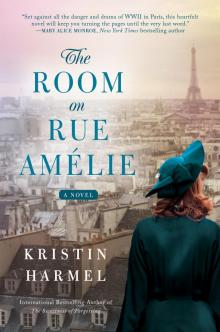 The Room on Rue Amélie
The Room on Rue Amélie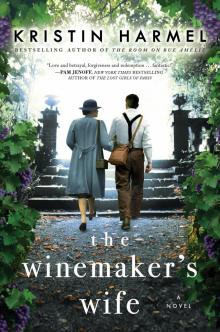 The Winemaker's Wife
The Winemaker's Wife The Forest of Vanishing Stars
The Forest of Vanishing Stars The Book of Lost Names
The Book of Lost Names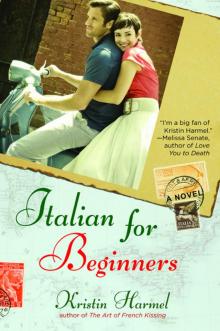 Italian for Beginners
Italian for Beginners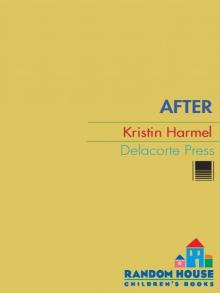 After
After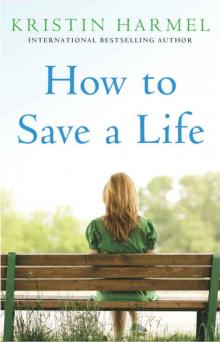 How to Save a Life
How to Save a Life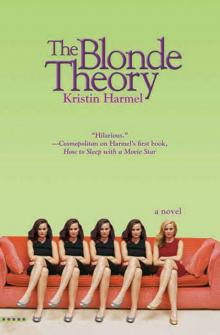 The Blonde Theory
The Blonde Theory The Sweetness of Forgetting
The Sweetness of Forgetting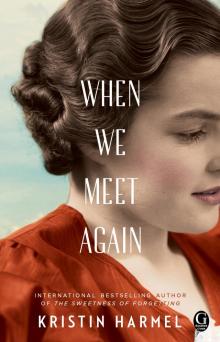 When We Meet Again
When We Meet Again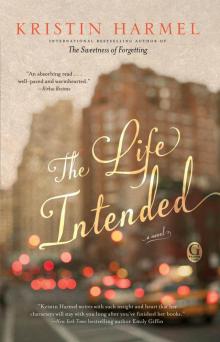 Life Intended (9781476754178)
Life Intended (9781476754178)